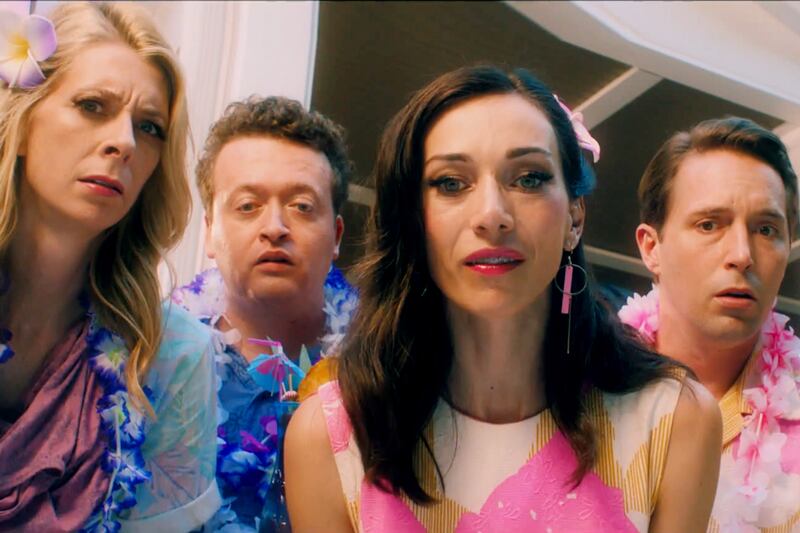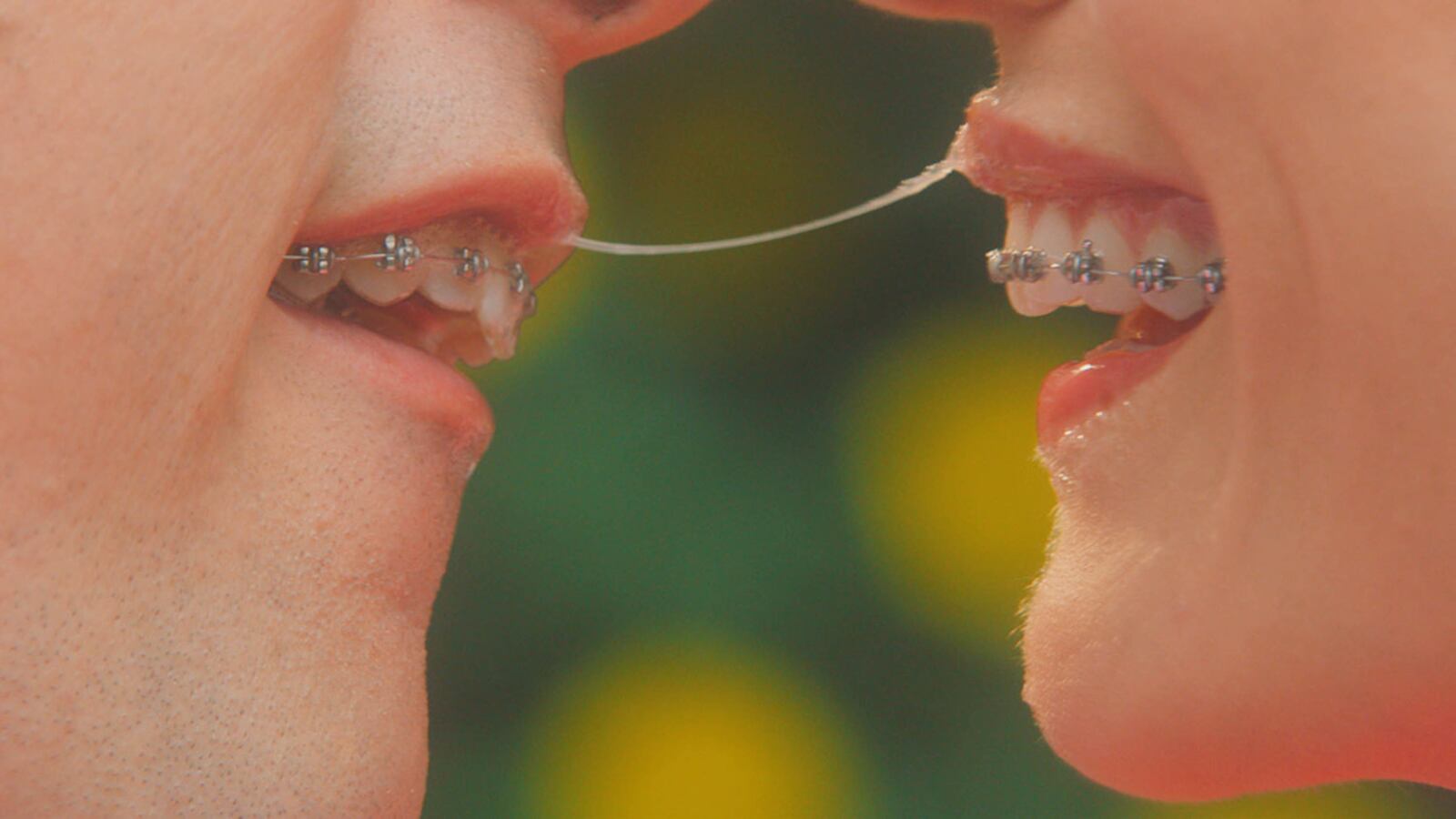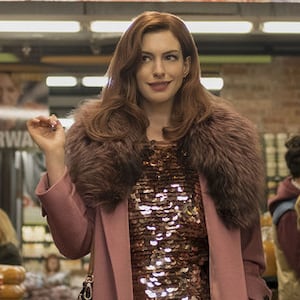After decades of critiques both playful and serious, there’s almost nothing novel left to say about the American suburbs. But as Greener Grass proves, there remain unique ways to say those familiar things.
As bonkers as any 2019 release to date, Jocelyn DeBoer and Dawn Luebbe’s comedy (in theaters Oct. 18) exists in some deranged Barbie Dreamhouse-style version of reality, all sunshiny Day-Glo colors, perfectly-manicured lawns, homes and coordinated outfits, and cheery smiles masking interior insanity. Recalling the likes of Parents, The Stepford Wives, Edward Scissorhands and the oeuvre of David Lynch, all while simultaneously establishing its own weirdo atmosphere of greed, envy, treachery and irrational urges, it’s the sort of surrealist fantasia that seems primed for cult status.
Written, directed and starring Upright Citizens Brigade vets DeBoer and Luebbe, whose performances are alternately robotic, drugged-out dreamy, and menacingly unhinged, Greener Grass concerns best friends Jill (DeBoer) and Lisa (Luebbe), whom we first meet at a soccer game where Jill’s son Julian (Julian Hillard) once again finds himself wailing on the ground after an innocuous bump from an opponent. “Oh my god, I didn’t even notice—you have a new baby!” Lisa exclaims to Jill, who’s holding the baby right in front of her. If that weren’t strange enough, Lisa’s comment about the tyke’s cuteness immediately inspires Jill to offer the newborn to her friend, who gladly accepts. “Enjoy,” Jill says, at which point the directors cut to opening credits overlaid on Jill’s twitchy-smiley mouth, her straight teeth decorated with braces, and the imagery set to a synthesizer score modeled after Goblin.
The creepiness doesn’t subside. At a barbeque, Jill and Lisa make out with their husbands (also wearing braces), only to then realize, “Wait a second, wrong husband!” (a mix-up caused by the fact that Lisa’s guy is now holding Jill’s baby). This awkward kissing goes on for an uncomfortably long time, and stirs up resentment in Lisa, who clearly covets Jill’s spouse Nick (Saturday Night Live’s Beck Bennett). Jill, however, is equally bitter at her BFF for renaming her former infant, which makes sense except for the fact that, you know, Jill gave the baby away for no good reason.
The warped and idiosyncratic passions, animosities, materialistic desires, mating habits, and social dynamics of suburbia (where everyone only drives golf carts) are on full display in Greener Grass, filtered through a comedic sensibility that places a premium on out-of-left-field absurdity. Thanks to a new purification system, Nick only drinks the water found in his swimming pool, even bringing jugs of it with him wherever he goes. Jill’s friend Kim Ann (Mary Holland), in the midst of a divorce from her husband, looks down on Jill for bringing a dip that only has five, rather than seven, layers. At a bowling alley birthday party, Lisa and Marriott (Janicza Bravo) greet each other with not-so-passive-aggressive digs about each other’s dresses (“Are you an ice dancer?” “No, are you pregnant?”). And at Nick’s birthday cookout, Julian sings his dad “Happy Birthday” but, before he can finish, falls face-first into the pool—and emerges as a golden retriever, which pleases Nick because now his son is fast and athletic.
None of this makes the least bit of sense on a literal level, but each of Greener Grass’ ridiculous twists is rooted in a particular form of suburban parental craziness, be it their competitions with each other over status (and their kids’ accomplishments), their demanding and selfish expectations for their offspring, their infatuation with appearances at the expense of personal and familiar happiness, and their fears about the corrupting nature of media on young minds. The last of these provides the film’s single biggest laugh, when Lisa and nerdy husband Dennis’ (Neil Casey) adolescent son Bob (Asher Miles Fallica) watches a TV show called Kids With Knives and immediately transforms into a profane hellraiser, screaming at his parents, “You assholes don’t even let me drive!”
There’s a teacher who sings classroom songs about her murderous mother, a restaurant meal that ends with everyone eating spilled entrees off the floor, a TV commercial for “Baby-Bird” food that’s been processed by moms’ mouths (“because machinery is not a mother”), and an entire subplot about a yoga teacher-killer—the police suspect it was a grocery store bagger—who appears to be hunting Jill. Greener Grass routinely assumes the POV of this giggling lunatic as they spy on Jill, and the fact that DeBoer and Luebbe only depict the individual’s hands (if at all) further underscores their film’s bizarre affinity for Dario Argento giallos. At the same time, they routinely let their story veer off into mind-boggling inanity, as when Lisa picks up a soccer ball at one of her son’s games, puts it under her dress, and promptly says she’s pregnant, much to the congratulatory cheers of Dennis and company.

That ball is eventually birthed and named “Twilson” (because Tom Hanks’ baby is already named Wilson, of course), which is emblematic of the material’s anything-goes verve. DeBoer and Luebbe’s turns are chipper to the point of being disturbed, and yet they maintain just enough semblance of normalcy to keep things from totally spiraling out of control. The same goes for their direction: their neatly symmetrical compositions, low-angled zooms into close-up, and occasional doses of slow-motion enhance the action’s off-kilter mood. Their film feels like the sort of quasi-nightmare you’d have after being dosed by a dentist with too much nitrous oxide—goofy and gauzy and more than a bit sickly sweet.
The power of peer pressure, and the urge to conform (and to demand conformity from others), eventually plays a role in Greener Grass, which loses some comedic steam on its way to its conclusion (if one can call it that; this is hardly a narrative-driven affair). Nonetheless, if its humor eventually wanes, its tongue-in-cheek horror stays potent up to its final moments, in which there’s no worse fate than losing the very things that define you and suburban success—especially since, as DeBoer and Luebbe contend, there’s no escaping this psycho social milieu.







